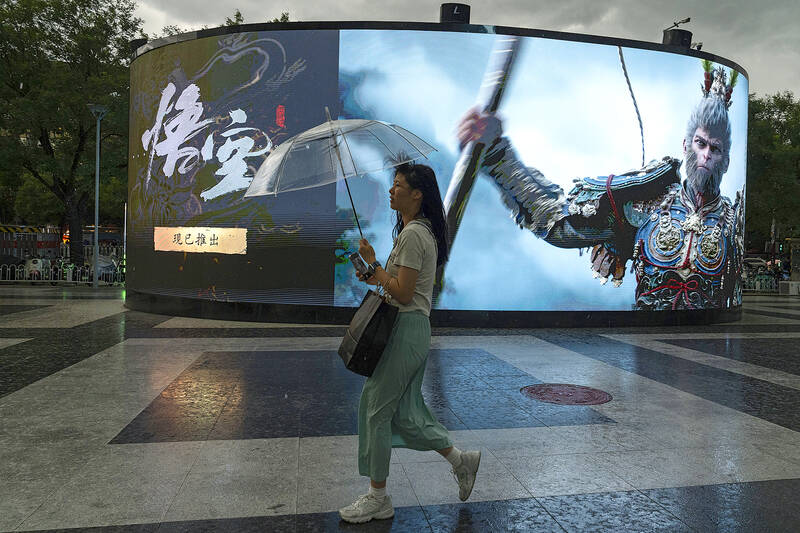Some gamers who received a copy of Chinese game Black Myth: Wukong (黑神話:悟空) were given guidelines for what to talk about as they streamed it. Discussing its stunning cinematic graphics, mythical 16th-century plotline and engaging gameplay was permitted. But calling for equal rights for women? Off-limits.
Hero Games, one of the early backers of Game Science, the studio behind Wukong, didn’t explain what it meant by including “feminist propaganda” on the list of forbidden talking points, and didn’t respond to my request for comment. Also among the don’t-mention topics were COVID-19, China’s game industry or anything instigating “negative discourse.”
The made-in-China blockbuster game is smashing playing records and receiving widespread critical acclaim both inside and outside the country. But the “feminist propaganda” ban was a curious thing to mention. What could have been a golden opportunity to use a runaway gaming hit to spark conversations about women’s rights in China instead became a lightning rod for criticism.

Photo: AP
HISTORY OF DISRESPECT
Perhaps the creators of the game didn’t want to draw any more attention to a controversy that erupted about four years ago, when Game Science released a popular trailer for Wukong. The studio’s founder and CEO then publicly posted a series of vulgar, sexually explicit comments to celebrate the public reception.
At the time, many women gamers expressed outrage and shared their own stories about the pervasive sexism within China’s broader gaming sector. (A concept artist based in Chengdu said she had been explicitly instructed by an undisclosed company to design female characters that “give people an urge to masturbate.”) Even years ahead of its release, some women, who make up roughly half of China’s gamers as of last year, were rethinking whether to purchase Wukong. But like many feminist movements on China’s highly censored Internet, much of this momentum was ultimately silenced.

Photo: EPA-EFE
Last year, gaming outlet IGN published a deep-dive, alleging a rampant history of disrespect toward women at Game Science. It pointed to derogatory advertisements, crude remarks from staff and a sexist 2013 diatribe from a co-founder decrying how games for men and women are not the same due to biological differences. Game Science has not publicly responded to the allegations to IGN, or to any other Western media outlets.
STREISAND EFFECT
The “feminist propaganda” censorship request has had a bit of a Streisand effect, with many gamers and outlets only drawing more attention to the topic and the studio’s past controversies. A hashtag on Chinese social media platform Weibo that translates as “Black Myth: Wukong insults women” was viewed millions of times before internet censors cleaned up posts that spread, among other things, “gender opposition.”
Many posts on both Chinese and Western social media platforms questioning Game Science’s treatment of women in the past were attacked and criticized, revealing how fiercely many will work to ensure that gaming is still a man’s world.
State-backed Chinese news outlet Global Times ran an editorial this week blaming criticism of the game on anti-Chinese sentiments abroad and racism. It named a Canada-based consulting firm, Sweet Baby Inc., in relation to the attacks in the Western media. Sweet Baby has been the subject of conspiracy theories that it launched a smear campaign after Game Science refused to work with them. The firm, which offers story and sensitivity consulting to game studios, told me that these rumors are a complete fabrication, and that they have never been in touch with Game Science or sought to work with them on Wukong.
This backlash amid the breakout global success of Wukong doesn’t take away from the pride many Chinese people feel about their culture being represented so significantly in a global arena. But it may be hard for the more than 689 million women in China to feel heartened by this win from an industry that has a long history of treating them as second-class citizens.
MISSED OPPORTUNITY
Wukong’s star power should be used to help shine a light on the Chinese feminist movement. Leta Hong Fincher, author of the 2018 book Betraying Big Brother: The Feminist Awakening in China, argued that feminism poses the greatest threat to China’s authoritarian regime, which is partly why it has faced such high censorship. Prominent activists have been detained. Last year, a CCP-affiliated think tank blamed “the spread of radical feminism” for having a negative impact on the country’s birth rate. The World Economic Forum ranked China 106 out of 146 countries in its 2024 Global Gender Gap index.
Women are increasingly active consumers in the gaming industry: The growth rate of new female gamers in Asia is nearly double that of males. Game Science dismissing the Wukong controversy as feminist propaganda or part of a Western DEI agenda will be unwise in the long run, especially as Chinese companies increasingly look to global audiences to boost revenues.
Instead of suppressing this dialogue, studios like Game Science should be driving the narrative.

The canonical shot of an East Asian city is a night skyline studded with towering apartment and office buildings, bright with neon and plastic signage, a landscape of energy and modernity. Another classic image is the same city seen from above, in which identical apartment towers march across the city, spilling out over nearby geography, like stylized soldiers colonizing new territory in a board game. Densely populated dynamic conurbations of money, technological innovation and convenience, it is hard to see the cities of East Asia as what they truly are: necropolises. Why is this? The East Asian development model, with

June 16 to June 22 The following flyer appeared on the streets of Hsinchu on June 12, 1895: “Taipei has already fallen to the Japanese barbarians, who have brought great misery to our land and people. We heard that the Japanese occupiers will tax our gardens, our houses, our bodies, and even our chickens, dogs, cows and pigs. They wear their hair wild, carve their teeth, tattoo their foreheads, wear strange clothes and speak a strange language. How can we be ruled by such people?” Posted by civilian militia leader Wu Tang-hsing (吳湯興), it was a call to arms to retake

This is a deeply unsettling period in Taiwan. Uncertainties are everywhere while everyone waits for a small army of other shoes to drop on nearly every front. During challenging times, interesting political changes can happen, yet all three major political parties are beset with scandals, strife and self-inflicted wounds. As the ruling party, the Democratic Progressive Party (DPP) is held accountable for not only the challenges to the party, but also the nation. Taiwan is geopolitically and economically under threat. Domestically, the administration is under siege by the opposition-controlled legislature and growing discontent with what opponents characterize as arrogant, autocratic

When Lisa, 20, laces into her ultra-high heels for her shift at a strip club in Ukraine’s Kharkiv, she knows that aside from dancing, she will have to comfort traumatized soldiers. Since Russia’s 2022 invasion, exhausted troops are the main clientele of the Flash Dancers club in the center of the northeastern city, just 20 kilometers from Russian forces. For some customers, it provides an “escape” from the war, said Valerya Zavatska — a 25-year-old law graduate who runs the club with her mother, an ex-dancer. But many are not there just for the show. They “want to talk about what hurts,” she